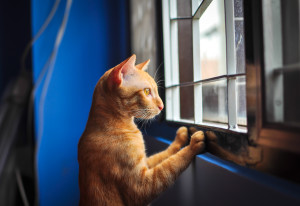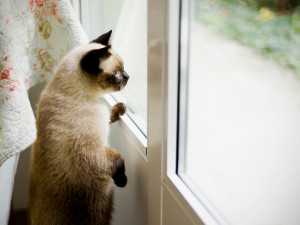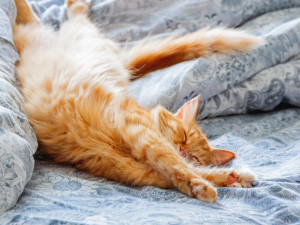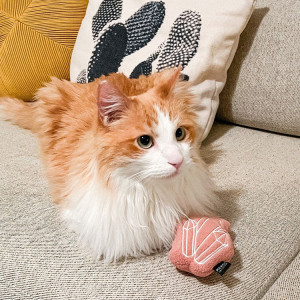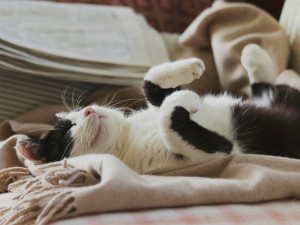Your Cat’s Anxiety—Explained
Because they’re probably not going to tell you why they just scratched the heck out of the couch.
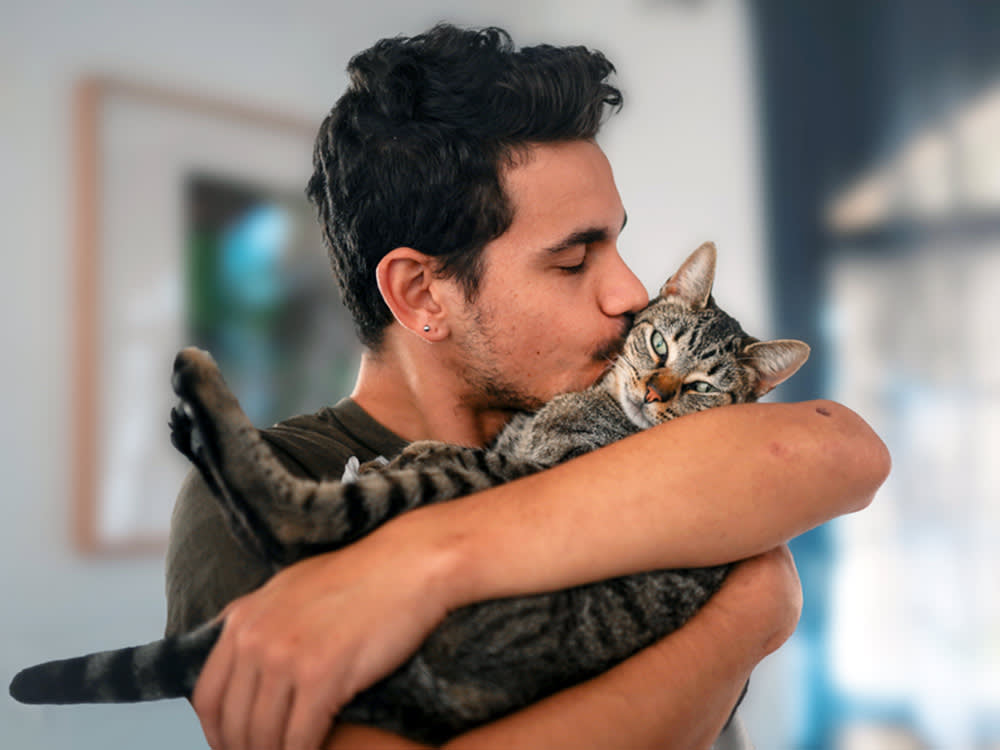
Share Article
In This Article:
Types of Cat Anxiety Cat Anxiety Symptoms Anti-Anxiety Meds for Cats Natural Remedies and Supplements
Just like humans, cats can experience anxiety that affects their overall wellbeing and quality of life. Understanding the causes of cat anxiety and recognizing the signs is the first step in helping your feline companion feel more at ease.
Cats can make for mysterious, fascinating companions. Many cats seem to be permanently aloof and regal, waiting for their humans to attend to their every need. Other cats are basically Golden Retrievers in feline form, doing silly things and always ready for playtime or cuddling. But some cats seem to be upset by everything, retreating to safe spaces and hiding places after the smallest trigger. Parents of these cats often wonder, Can cats have anxiety?
Types of cat anxiety
Cats experience a variety of anxiety disorders. Although stress is a part of life (even for cats), a consistently inappropriate response to stress can make a cat’s life miserable. Because cats aren’t the best at talking about their feelings, a diagnosis of anxiety issues is often made based on known triggers, recent environmental changes, and the types of anxiety-related behaviors displayed.

Most cats experience anxiety disorders that fall into one of these broad categories, but there is a good bit of overlap between these syndromes.
Generalized anxiety
Cats with generalized anxiety disorder seem fearful or anxious, no matter what is going on. They’re constantly in a state of worry and have difficulty relaxing, often pacing, trembling, or vocalizing despite a lack of an obvious disturbance in their area.
Separation anxiety
Despite their antisocial reputation, cats do form strong social bonds with the people they spend time with. While many cats will entertain themselves or relax while their parents are away, some do not deal well with being separated from their favorite people. Separation anxiety in cats can escalate to a full panic, especially when the separation is accompanied by changes or other unusual activities (packing for a vacation, moving to a new house, new people visiting, etc.)
Phobias
Cats can develop phobias or fears about anything that they find upsetting. Some common fear-based anxieties center around experiences that cats often find unpleasant and would like to avoid. These can include things like:
Visits to the vet’s office
Car rides
Encounters with dogs
New visitors to the house
Loud noises
Social anxiety and inter-cat conflicts
Multi-cat households can develop complex hierarchies their human members are unaware of. Even in situations where there is no obvious aggression (biting, scratching, fighting), cats that are less social or lower in the hierarchy may experience stress-inducing situations like resource guarding or exclusion from social behaviors.
Cat anxiety symptoms
Cats with anxiety problems can act out in many ways. Anxiety symptoms in cats may escalate over time or wax and wane based on the stressor. Signs of a stress-related disorder may be obvious or subtle and can include:
Excessive vocalization
Some cats are naturally just chatty (looking at you, Siamese cats), but excessive vocalization can be a sign of anxiety in cats. Anxious cats may yowl or meow persistently when faced with a stressor. If you’re noticing that your cat is talking consistently when faced with something that’s possibly upsetting (beyond the bottom of the food bowl being visible), it could be a sign of anxiety.
Destructive behavior
Cats can panic or react aggressively when faced with overwhelming stress or anxiety. This can result in damage to household items, injuries to people, or fights with housemates.
Inappropriate pooping and peeing
Cats often let their unhappiness be known by peeing on something. Although this behavior can seem spiteful — some cats will stare you in the eye as they pee on your favorite blanket — it is often rooted in anxiety. Cats with any type of anxiety may pee or poop outside of the litter box. The location and frequency of the misdeeds may give a cat behaviorist some clues about the cause. Because your cat doing their business in the wrong places can also indicate a medical problem, get any litter box issues checked out by your veterinarian as soon as possible.
Changes in grooming habits
Depending on the cause of their stress, anxious cats may groom excessively or may decrease their grooming dramatically. Grooming behavior often decreases in cats experiencing social anxiety due to housemates. They may not feel safe putting themselves in a vulnerable position to clean all their nooks and crannies. Some cats may also groom or barber (chew their hair) excessively if they’re displaying OCD-like behavior due to their anxiety.
Hiding and avoidance behaviors
Scared cats want to find a safe place to be until their stress levels have reduced and the trigger for their fear is gone. Hiding in closets, beneath beds, or anywhere that helps them stay out of reach is a common behavior in cats suffering from an anxiety disorder.
Facial expressions and body posture
Cats can look stressed, just like people. Reading a cat’s emotions is not something that most cat parentsopens in new tab are great at initially, but many will learn to figure out their cat’s mood based on their ear position, facial expression, and body posture. Relaxed cats generally have an ears-forward, relaxed-eyed, tail-up appearance, while stressed cats will have a more guarded posture and keep their ears back and eyes wide. Cat body language is incredibly complex and reflects an intricate interplay between friendliness and caution, offense and defense.
Anti-anxiety strategies for cats
If you’re worried your cat is overly anxious in general or gets very anxious in specific situations, talking to your veterinarian is key to diagnosing and treating their issues. Constant stress is bad for your cat’s health and wellbeing, so getting their anxiety under control both eases their mind and reduces the negative effects of stress hormones on their body. Some common strategies to treat anxiety include:
Predictable routines
Having expected times for feeding, litter box cleaning, play activities, and rest can help give your cat’s day structure. A set pattern can help to reduce anxiety and make your cat feel more secure in what to expect.
Environmental enrichment
Mental stimulation can help to limit loops of stressful thoughts and behaviors. Cats benefit from playing with a variety of toys, learning tricks, solving food puzzlesopens in new tab, and simple social interaction. Environmental enrichment also includes grooming behaviors like gentle petting and brushing. Just make sure your cat is receptive to handling before you start so that interaction with you doesn’t become another stressor.
Litter box management
Cats can experience a lot of stress about the places where they pee and poop. It’s recommended to have at least one litter box per floor of your house that your cat has access to and at least one more litter box than the number of cats in your house. Litter boxes should be scooped at least daily and cleaned weekly (cat noses are sensitive). Keep litter boxes in quiet areas where your cat feels safe. Very few cats feel comfortable going to the bathroom next to a washer or dryer that’s making loud noises.
Anti-anxiety medications
In addition to changes to the household environment, your vet may recommend medication to help manage your cat’s anxiety. Anxiety meds for cats can be tricky because of potential side effects and the difficulty of getting them into your cat. Your vet may recommend different types of medications based on the type of anxiety your cat is experiencing.
Event-based anxiety (like phobias to vet visits, thunderstorms, and car rides) may be treated with short-acting medications like pregabalin, gabapentin, beta blockers, or benzodiazepines (think kitty Xanax or Valium). Long-term anxiety issues like separation anxiety or general anxiety disorder may be treated with tricyclic antidepressants or selective serotonin reuptake inhibitors (SSRIs), which are medications adopted from human medicine.
Natural remedies and supplements
Before trying antidepressants, your veterinarian may recommend attempting natural supplements for anxiety. The effectiveness of these remedies has not been tested extensively, but there is some evidence to support their use in addition to behavioral and environmental modification strategies.
Pheromones
Many cat pheromones have been isolated and studied. Some of these can be used to reduce stress due to many causes of anxiety like event-based fears, social stress, and separation anxiety. There are sprays and diffusersopens in new tab available to help keep your cat calm.
Nutritional supplements
Probiotics containing Bifidobacterium longum strain 999 (BL999) have been shown to reduce anxiety in dogs and have shown promise for doing the same in cats.
α-Casozepine, which is derived from the proteins in cow milk, may be effective in reducing the stress associated with vet visits without causing sedation.
L-tryptophan has shown some promise in reducing negative behaviors in multi-cat households.
L-theanine is an amino acid used to improve mood and behavior that has been shown to decrease stress levels in cats.
Cat diets
There are specialized diets available that are aimed at reducing stress. These diets are formulated with additives like those above to help reduce anxiety without the need for pills. Anti-stress formulations are available for some urinary cat diets as well due to the link between bladder issues and stress in cats.
CBD
Cannabidiol (CBD) has become a popular product and seems to be recommended for everything. While it may have some anxiety-reducing properties in people, results in pets have been mixed. CBD for cat anxiety disorders has not been evaluated, so the appropriate dose, frequency, and possible side effects are unclear.
Always talk to your veterinarian before starting a supplement for your cat, even if it seems harmless — there can sometimes be unexpected reactions with medications or other health issues. Working with your veterinarian to resolve your cat’s anxiety issues can keep your kitty happy and de-stressed.
FAQs (People also ask):
Can cats have separation anxiety?
Cats are social animals and can develop separation anxiety when apart from their favorite person. If you’re worried your cat has separation anxiety, talk to your vet about strategies to help your cat adjust to your departure.
Why is my cat suddenly clingy?
Cats can become clingy for many reasons. Sometimes they’ll seek attention because they’re feeling unwell. Sometimes they may go to you as a safe place and protector if they’re feeling anxious.
References:
American Association of Feline Practitioners – Feline Behavior Guidelinesopens in new tab
Understanding Behavior: Generalized Anxiety Disorderopens in new tab
Scientific Validation of Cannabidiol for Management of Dog and Cat Diseasesopens in new tab
Separation Anxiety Syndrome in Dogs and Catsopens in new tab

Dr. Bartley Harrison, DVM
Dr. Bartley Harrison is a veterinarian with more than 19 years of experience. He has treated a variety of species in emergency and speciality practices for both large and small animals. His primary interests as a vet are emergency medicine and critical care.
Related articles
![orange cat looking out window]()
Is Your Cat’s Separation Anxiety Ruining Their Life and Yours?
Why your cat freaks out when you’re away (and how to help).
![Siamese cat standing on two feet in order to look out of the window]()
How to Ease Your (Cat’s) Return-to-Office Anxiety
A veterinarian and a behaviorist’s tips for preparing your cat for your new WFO schedule.
![Cat stretching on blue bedding]()
5 Calming Products for Cats
Because New Year’s Eve is never a silent night.
![Dog sitting in a tent surrounded by candles and crystals]()
Alternative Therapies Can Zen Out Your Pet, Too
Wellness treatments like acupuncture, Reiki, and sound baths are helping pets heal and bond with their parents.
![cat with the crystal toy in pink]()
You Can Transfer Your Woo-Woo Crystal Habit to Your Stressed-Out Cat
Merci Collective founder Chani Ronez on her new collection of crystal and catnip-infused toys for cats.
![Black and White cat with its eyes closed laying on its back on a scarf]()
Is My Cat Happy?
In this excerpt from her new book, Purr: The Science of Making Your Cat Happy, animal behaviorist Zazie Todd shares science-backed insights into our cats’ moods.

